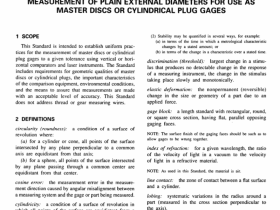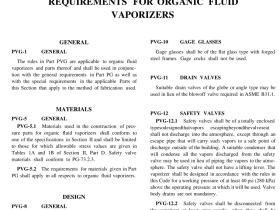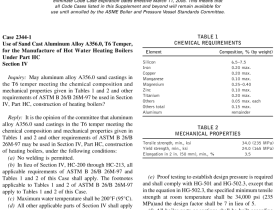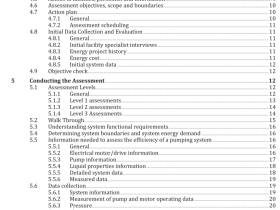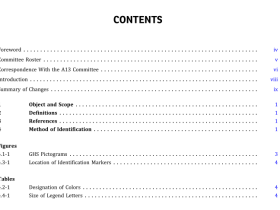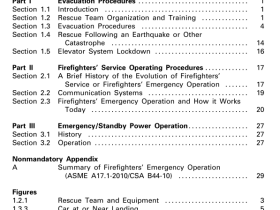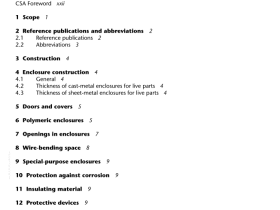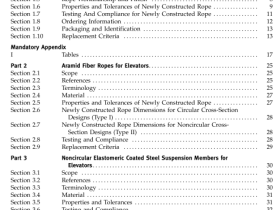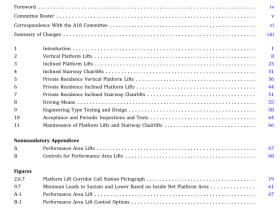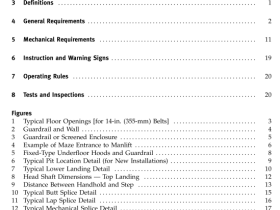ASME B18.31.5 pdf download
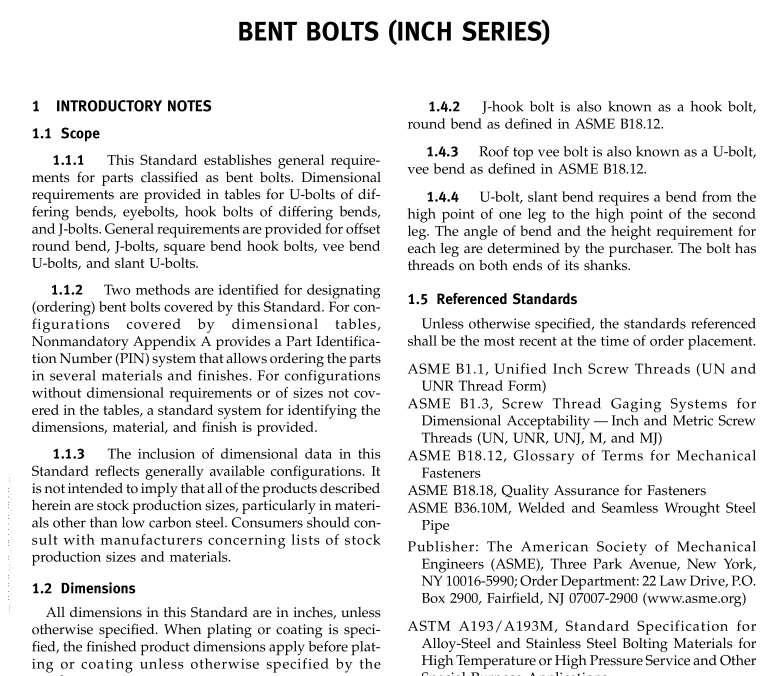
ASME B18.31.5 pdf download Bent Bolts (Inch Series)
2.5 Ends For bolts made with UNC threads, the ends shall be chamfered or the first thread rolled undersize. For bolts made with UNF threads, the ends shall be chamfered.
2.6 Materials Unless otherwise specified, the products in this Standard shall be made of low carbon steel as defined here as steel with less than 0.28% carbon. The minimum tensile strength for carbon steel shall be 36,000 psi unless a specific material specification is invoked or a higher tensile strength is specified by the purchaser. Nonmandatory Appendix A provides PIN designa- tors for some commonly used materials for parts illus- trated in this Standard. This Standard does not supersede or change any requirements of those stan- dards referenced in Nonmandatory Appendix A. Parts ordered using the PIN designators must still meet the requirements of the associated standards. Nonmandatory Appendix A does not limit the material options that can be ordered using the modified tradi- tional system for identifying bent bolts provided in para. 2.9.2.
2.7 Finishes The purchaser shall designate the required finish. Unless otherwise specified, plain finish steel shall be coated with a light oil to protect from corrosion during transportation and storage. It is recommended that electroplated bolts be finished in accordance with ASTM F1941. Hot-dip zinc coating shall be in accordance with ASTM F2329. For other coated products, the purchaser shall specify the coating and thickness. A number of coatings are identified in Nonmandatory Appendix A. Unless otherwise specified by the purchaser, coating thickness and embrittlement testing conformance shall be determined in accordance with the specified coating standard. If the number of samples to be tested is not identified in the coating specification, the number of samples shall be as required by ASTM F1470.
2.8 Workmanship Workmanship and surface discontinuities shall con- formto the requirements in the referenced productmate- rial standard (see para. 2.6). When the engineering application or the application requirements necessitate that surface discontinuities be more closely controlled, the purchaser shall specify the applicable limits in the original inquiry and purchase order. When a referenced fastener product or material stan- dard does not address cracks and bends, there shall be none that are visible without magnification.
2.9 Designation Bent bolts covered in this Standard may be designated (ordered) by either of two methods. For standard bent bolts to the dimensions shown in the tables, the bolts may be ordered by the PIN system identified in Nonmandatory Appendix A. The modified traditional designation as identified in para. 2.9.2 must be used when the desired bolt configuration is not defined in the tables of this Standard. This modified traditional designation method can be used forconfigurations identified in the tables, but the PIN method identified in para.
2.9.1 is recommended.
2.9.1 Designation byPIN. The PIN system for desig- natingparts is contained inNonmandatoryAppendix A. Where dimensional tables have been developed for this Standard, the tables will include PIN fields to be used to identify the diameter and other characteristics in the system identified in Nonmandatory Appendix A. Using this system allows the bolt to be designated and ordered simply by the PIN. If dimensions other than those cov- ered by the tables are required, then it will be necessary to use the method outlined below to designate the requirements.
2.9.2 Modified Traditional System for Identifying Bent Bolts. The traditional system for identifying bent bolts has been defined in a standard issued by the Industrial Fasteners Institute (IFI). Many manufacturers use a similar method.
2.9.2.1 For this Standard the following modifica- tions have been made to simplify and standardize the system. The modifications to bent bolts are as follows:
(a) The D, L, C, and T dimensions are used in the sequence shown for all configurations.
(b) Additional characters (A, B, E, M, and N) as identi- fied for each configuration follow the D, L, C, and T dimensions in alphabetical order.
(c) The R designation is not listed for round hook and J-bolts, since this dimension is equivalent to C/2. The R radius is one-half the basic inside width C.
